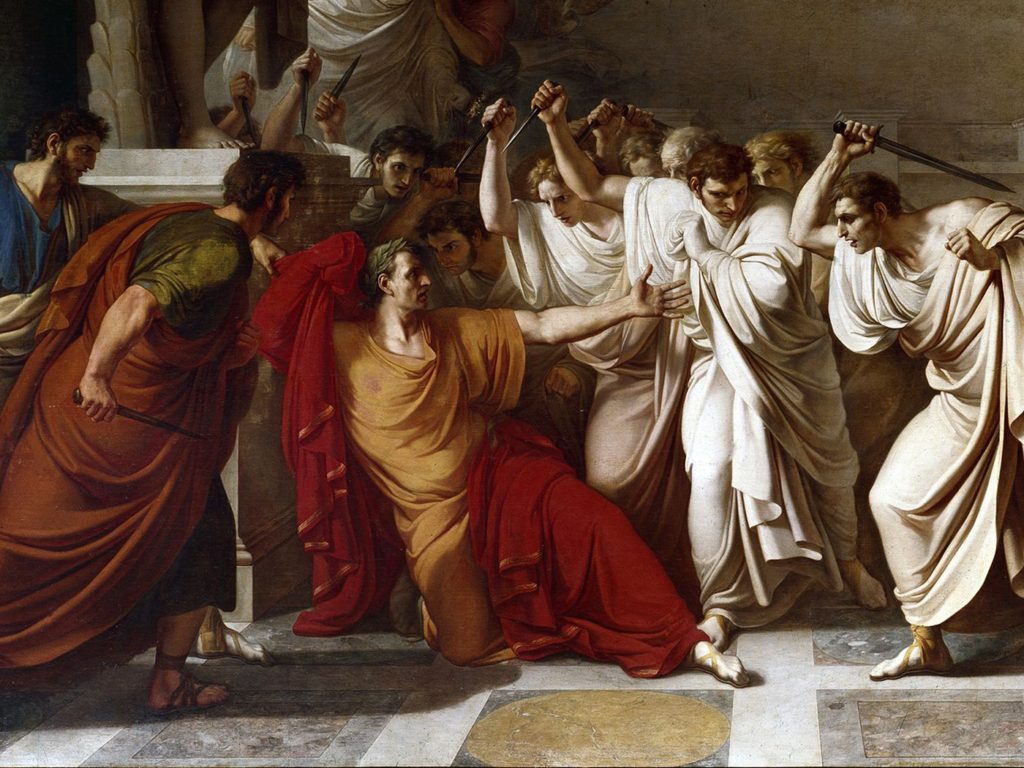Thursday
A Congressional investigation into the January 6 invasion of the U.S. Capitol is now underway, and as I watched the Capitol police give their testimony— and watched GOP members of Congress continue to cower before Donald Trump—I found myself thinking of what Shakespeare’s Julius Caesar says about courage and cowardice.
More on that in a moment. First, however, I note that Julius Caesar lines up remarkably closely to Trump’s coup attempt, even though in this case the play is less black and white. Trump simply wanted supporters to pressure Vice-President Mike Pence and GOP Republicans to overturn Joe Biden’s victory, even though the election was clean. In Julius Caesar, by contrast, the senators claim they are forestalling a potential coup but their motives are unclear. Nor is Caesar portrayed as a tyrant. In any event, the assassination proves to be a catastrophic mistake, what with the subsequent mob violence and civil war. By the end of the play, conspirators Cassius and Brutus commit suicide and the Roman republic for which they sacrificed themselves comes to an end.
In the play, we see ingratitude such as that shown by the GOP towards the Capitol police. Cassius recalls a moment when he saved Caesar from drowning, only to be put down by Caesar in later interactions. The two were engaged in a swimming contest:
But ere we could arrive the point proposed,
Caesar cried ‘Help me, Cassius, or I sink!’
I, as Aeneas, our great ancestor,
Did from the flames of Troy upon his shoulder
The old Anchises bear, so from the waves of Tiber
Did I the tired Caesar. And this man
Is now become a god, and Cassius is
A wretched creature and must bend his body,
If Caesar carelessly but nod on him.
I think of the Republican congressman who refused to shake hands with a Capitol policeman who had protected him, and of Minority Leader Kevin McCarthy reversing course and defending Trump’s participation in the events. Because McCarthy needs Trump’s support to become a god—or at least Speaker of the House—he is prepared to grovel to get it
Cassius is more like the rinsurrectionists than the police, however. Like the former, he is driven more by a sense of grievance than by genuine concern about the republic’s survival. Brutus is the nobler one, prepared to give up his life for a higher ideal. Likewise, the police are seeking only justice and an acknowledgement of their sacrifice– neither of which the GOP appears prepared to grant.
Instead, Republicans are engaged in a Marc Antony-style dance with truth. Everyone knows the opening to Antony’s famous speech, which captures our attention with its lofty “Friends, Romans, countrymen, lend me your ears.” The speech itself, however, is a tour-de-force in bad faith argumentation. Antony has had to promise that he will only deliver a funeral elegy for Caesar, nothing more, but he behaves instead like those Trump supporters who find ways to hint at election fraud without actually saying anything that could make them legally liable for perjury. For that matter, Trump himself stirred people up to attack the Capitol without ever saying so directly, thereby retaining plausible deniability.
Antony claims that he is on the podium “not to praise Caesar but to bury him.” Through skillful use of sarcasm, innuendo, and populist rhetoric, however he manages to both praise Caesar and cast aspersions against the conspirators. (Marc Antony claiming to be a populist is a joke.) Through his rhetorical skills, he succeeds is stirring up a murderous pro-Caesar mob that goes after the conspirators and anyone they associate with them, including an innocent poet who shares a name with one of the senators. Antony gains the upper hand and Brutus and Cassius must flee for their lives.
As I say, the parallels are inexact. The January 6 insurrectionists would certainly like to see themselves as high-minded republicans, as did the founding fathers that some of them cite. Given that their claims of Biden’s tyranny are fraudulent, however, the true saviors of the republic must be seen as those Capitol police. After all, their bravery made possible Congress voting to certify the election results, which it did later that night.
Also heroic are Lyn Cheney and Adam Kinzinger, the two Republicans who have braved their party’s ire and agreed to participate in the House investigation of January 6. About them, we can say what Caesar himself says of courage and cowardice:
Cowards die many times before their deaths;
The valiant never taste of death but once.
It’s possible that their courage will cost them reelection, but at least they won’t have engaged in the reversals, distraction tactics, and moral equivocations of their colleagues. In other words, they will have tasted death but once, not through a series of small, self-inflicted soul lacerations. Cheney and Kinzinger are the true small-r republicans while the others are RINOs (republicans in name only).
At the end of Julius Caesar Marc Antony, who can now afford to be magnanimous as all his opponents are dead, delivers a eulogy to Brutus. The man who once mockingly and sarcastically called Brutus “an honorable man” now says that he alone of the plotters acted out of higher ideals:
This was the noblest Roman of them all:
All the conspirators save only he
Did that they did in envy of great Caesar;
He only, in a general honest thought
And common good to all, made one of them.
His life was gentle, and the elements
So mix’d in him that Nature might stand up
And say to all the world ‘This was a man!’
If Trumpism triumphs and Cheney and Kinzinger go down to defeat, will Republicans try to reclaim the moral high ground by delivering such eulogies? We’ve seen that no act of hypocrisy is beyond them.


